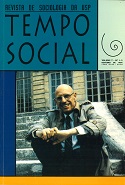Michel Foucault and the theory of power
DOI:
https://doi.org/10.1590/ts.v7i1/2.85209Keywords:
Foucault, Theory of power, Authority, Power as an asymmetric relationAbstract
Power is defined in Michel Foucault´s conceptions as a set of methodological cautions rather than a complete theory. As oposed to current modern conceptions, Foucault deals with a definition of power that does not include "the king" as a source and a center from where power is supposed to flow. After comparing different modern current definitions of power, emphasizing their need the impersonation of a "king" to explain power, Foucault´s definition is presented as an assymetrical relationship. Rather than two preexisting actors, one full of power and other powerless, which would explain authority and obedience, that relationship is presented as resulting in the existence of two political actors, a "sovereign" and subject. As an illustration, a current situation in Brazilian politics is commented in Foucault´s terme.Downloads
Download data is not yet available.
Downloads
Published
1995-07-06
Issue
Section
Foucault - um pensamento desconcertante
License
Copyright (c) 1995 Tempo Social

This work is licensed under a Creative Commons Attribution-NonCommercial 4.0 International License.
How to Cite
Albuquerque, J. A. G. (1995). Michel Foucault and the theory of power. Tempo Social, 7(1/2), 105-110. https://doi.org/10.1590/ts.v7i1/2.85209


